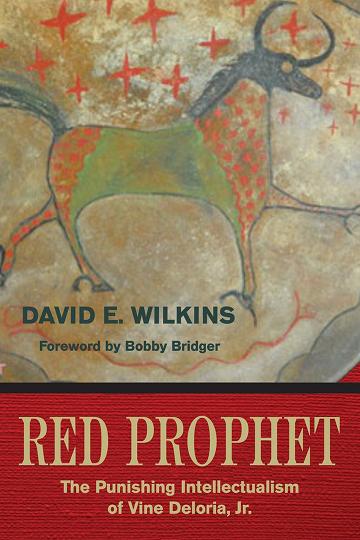 |
Canku Ota
|
 |
|
(Many Paths)
|
||
|
An Online Newsletter
Celebrating Native America
|
||
|
December 2018 - Volume
16 Number 12
|
||
|
|
||
|
Elizabeth Cook-Lynn:
Book About Vine Deloria's Influence A Page Turner
|
||
|
by Professor Elizabeth
Cook-Lynn - Native Sun
News Today Columnist
|
||
These days, the answer to the question “what are you reading?” is this: more Trump-ism than we care to acknowledge, what is the name and agenda of the latest person running for what public office (and its aftermath), even the news of what the Republicans have to say about the latest “tweet” from their leader, (or not), and finally the latest public thoughts by Obama on why the Affordable Care Act is still the best thing since sliced bread. In between all of that and the ten to 15 “robo” calls I get every day, I have managed to keep up with the good books that are available. When I gave a book signing on my latest publication the other day, (a memoir), I came across a great contemporary history of Indian Studies called Red Prophet, The Punishing Intellectualism of Vine Deloria, Jr. It is a page turner, and I have concluded that while there is so little time for reading these days, this one cannot be put aside.
Every now and then a book comes along that reminds us that there is a vast history of the real work (not just indulgences like memoirs) that Native writers have been doing in the 20th century that advances our knowledge of the “race” problem in the United States in important ways. Vine Deloria has always been my mentor even though I did not study with him. Even as I, too, began to write political stuff he always patted me on the head and gave me the feeling that “when you grow up you may amount to something”. He was, after all, the star of his time! This recent biographical treatise, Red Prophet by the Lumbee scholar Dr. David Wilkins who teaches at the University of Minnesota, tells us about the academic life and work of the most important political/law scholar of the 20th century, Vine Deloria, Jr. This bio piece is not just about “race”, it is about colonization, genocide, white supremacy, as well as the scholarly achievements of a man who spent his academic life analyzing what is wrong about the racist laws toward indigenous peoples by invaders and colonizers seeking land and power. What is wrong became the subject of Vine’s time and we are reminded by Wilkins’s history that it began early, about the time that a conference discussion at a symposium was held at Princeton University when Vine delivered a stunning paper on “Indian Law and Theology”. His point was that Native Nations (and particularly those with lots of treaty land like the Sioux), needed the support of both theological leaders and the legal profession if they were to benefit and thrive with “their moral and legal claims against the federal government and society.” He pointed out that the “most intractable and damning political issue was the omnipresent plenary power doctrine” which he said must be overturned. That is still, as we all know, the issue!! Vine’s work and influence, Wilkins tells us, takes us through the 1970’s, (chapter I), how to bring “activism” into the academies of the west; the 1980’s (chapter 2), when the resistance to racist federal and state colonizing authority gained strength; the 1970’s (chapter 3), the analysis of the history of how tribal governments reorganized through self-determination, and finally, a call to action, the unfinished agenda and how to move forward.
Elizabeth Cook-Lynn is a member of the Crow Creek Sioux Tribe, born and raised at Fort Thompson, South Dakota. The University of Nebraska Press published her memoir In Defense of Loose Translations this summer |
||||
|
|
||
|
|
||
| Canku Ota is a free Newsletter celebrating Native America, its traditions and accomplishments . We do not provide subscriber or visitor names to anyone. Some articles presented in Canku Ota may contain copyright material. We have received appropriate permissions for republishing any articles. Material appearing here is distributed without profit or monetary gain to those who have expressed an interest. This is in accordance with Title 17 U.S.C. Section 107. | ||
|
Canku Ota is a copyright ©
2000 - 2018 of Vicki Williams Barry and Paul Barry.
|
||
 |
 |
|
|
The "Canku
Ota - A Newsletter Celebrating Native America" web site and
its design is the
|
||
|
Copyright ©
1999 - 2018 of Paul C. Barry.
|
||
|
All Rights Reserved.
|
||
